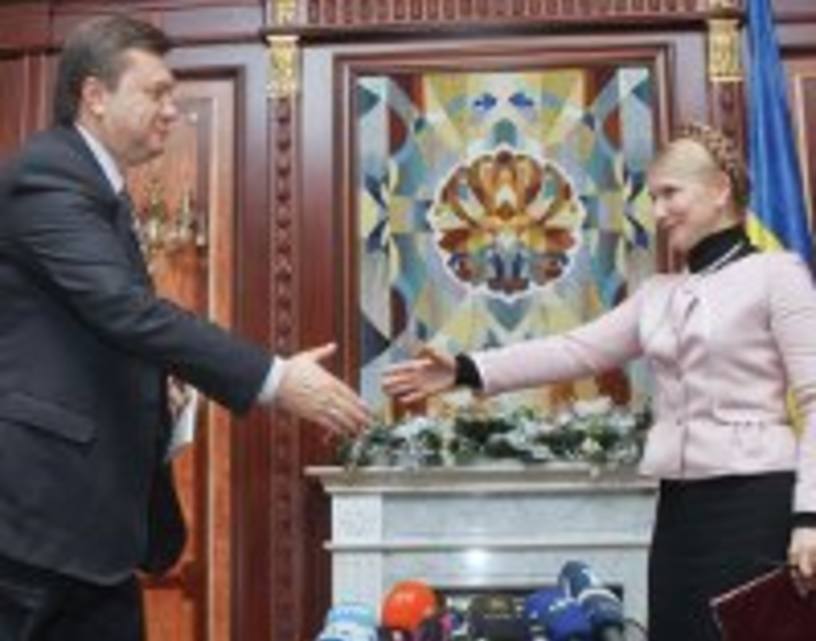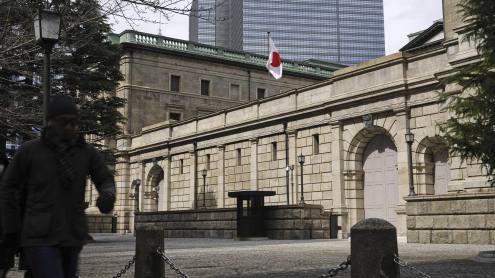The election last month of Viktor Yanukovich as Ukraine's president could help to stabilise the country's political landscape, after months of uncertainty during a turbulent election campaign. But the system remains sharply divided between President Yanukovich and Ukraine's prime minister, Yulia Tymoshenko, who controls the largest number of seats in the Ukrainian Rada (parliament). The risk of continued political uncertainty and even fresh parliamentary elections still lingers.
This is particularly dangerous for a government that is still waiting for about $5.5bn from its $16.4bn International Monetary Fund (IMF) loan programme. A fourth disbursement tranche was postponed in December 2009, pending greater clarity on when the government would meet the budgetary conditions attached to its loan.
"At the start of 2009, the IMF was given a broad mandate to be lenient across central and eastern Europe. But the IMF will be very different in 2010, because the risk of regional contagion has diminished, and I am not sure that the [Ukrainian] government realises this yet," says Brett Diment, head of the team that manages $4.6bn in emerging market debt for Aberdeen Asset Management.
Mr Diment is less concerned about the total debt stock, which was about 35% of gross domestic product in 2009 according to the IMF, and says refinancing risks are manageable for now. But funding the budget deficit itself is the problem. Ukraine's government announced a deficit of $2.6bn for 2009, but this excluded the delayed recapitalisation of 14 remaining troubled banks, and transfers of about $2bn into the budget from the conversion of special drawing rights that were part of the IMF loan programme.
The government has continued to auction debt in the local market, but is paying interest rates of about 28% on three-year paper to achieve this. Acting finance minister Ihor Umanskiy announced in January that the government would look to issue a Eurobond in April or May this year. But with one-year Ukraine sovereign credit default swap spreads at about 1300 basis points, investors say external debt markets are virtually closed to the sovereign - at least at any price that would make financial sense for the government.
Exchange rate risk
In addition to financing the budget, a revitalised relationship with the IMF would also secure against renewed exchange rate volatility. The Ukrainian hryvnia has stabilised at about 8 hryvnia to one US dollar, after halving in value at the height of the financial crisis. But investors believe the currency could begin to weaken again toward 10 hryvnia or beyond if there is prolonged post-election policy paralysis and the IMF loan remains on hold.
Such a development would be a blow for many banks, especially the largest mortgage lenders, Raiffeisen Aval and Ukrsibbank, the latter of which is owned by BNP Paribas. At least 85% of mortgages in Ukraine are dollar-denominated or indexed, with retail borrowers rarely hedging their exposure. As a result, the slide in the currency has brought about a wave of mortgage delinquencies.
Mortgage pain
Gerhard Boesch, deputy CEO of Aval, says the maxi-devaluation in the final quarter of 2008 drove up monthly mortgage repayments for many borrowers by as much as 60% in hryvnia terms. "Our main objective was to make it easier for borrowers who have the willingness to repay; it is not in our interest to repossess thousands of apartments or cars. That means reducing the monthly bill, by coupon reduction or postponing capital repayment, in the hope that full repayment can be made at a later date," he says.
Delaying repayments means the bank takes a hit on revenues and on the net present value of the mortgage, but avoids writing off part of the principal altogether. Taking a haircut on the principal of a loan is particularly unattractive for banks in Ukraine, because it incurs unfavourable tax treatment on the amount of principal forgiven.
Funding troubles
Many of the locally owned banks that have so far escaped administration have been forced to restructure foreign debts and allow loan portfolios to run down, including Finance & Credit Bank and First Ukrainian International Bank (FUIB). One distressed debt investor suggests some restructurings are opportunistic rather than necessary. FUIB extended the maturity on a $275m Eurobond due in February 2010 out to 2014, yet the bank is owned by System Capital Management, one of the country's largest conglomerates that reported revenues of almost $16bn in 2008.
But clearly, if the government is shut out of international funding markets, then the situation for the banks is even worse. "Any bank that is alive in Ukraine right now is talking to the multilateral financial institutions [MFIs], especially for managing the tenor risk on longer-maturity lending segments," says Margot Jacobs, senior advisor to the East Capital Financials Fund, which has strategic stakes in three Ukrainian banks.
One of those banks, Platinum, has been successful enough in collecting new deposits that it was able to fund a gradual renewal of consumer finance across 2009, mostly in local currency with six-month maturities. By contrast, many competitors have been reluctant to dip their toes back into the water, even though short-term hryvnia liquidity stabilised in mid-2009.
"At one stage, Platinum only really had three competitors," says Ms Jacobs. "Point-of-sale lending is a very statistical business and there are only two fairly young credit bureaux in Ukraine. For many of our competitors, most middle-management time is being taken up on existing clients and loans, with collections or restructuring on about 30% of portfolios."
A second East Capital investment, Nadra Bank, was taken into administration by the National Bank of Ukraine (NBU) in February 2009, pending a Eurobond restructuring that was agreed in December 2009. But the bank is now the subject of a dispute between Ms Tymoshenko's government (which wants to liquidate it) and businessman Dmitry Firtash, who has offered to invest UAH6bn to rehabilitate Nadra. Existing shareholders have also indicated that they are willing to contribute alongside the government to recapitalise the bank.
By contrast, East Capital's third investment, the Odessa-based Pivdennyi Bank, has fared rather better, staying in profit even during the toughest times in the first half of 2009. "Pivdennyi knows its clients in the Odessa region well. The bank often works with all the suppliers in a given local production chain, which allows it to understand and more accurately assess the real cash flows and borrowing capability of those companies," says Ms Jacobs.

Top Ukrainian banks by equity capital (as of October 2009)
Foreign bank opportunity
In general, however, the better-capitalised foreign banks with access to external funding from parents - which already constitute about 55% of Ukrainian bank capital - are likely to renew lending sooner than locally owned rivals. Both Aval and UniCredit-owned Ukrsotsbank implemented significant cost reductions and upgraded core IT platforms during the period when new lending stopped in 2009, providing a stronger base from which to expand in 2010.
"We are confident that we will see an improvement of the economy in 2010 with demand for loans growing again, especially for our corporate clients," says Harald Vertneg, chief financial officer of Ukrsotsbank.
Mr Boesch of Aval is especially optimistic about the agro-industrial sector, which has held up relatively well on the back of steady food prices worldwide. Aval is the leading lender to the sector, and he believes that the fresh appreciation of other regional currencies (such as the Russian rouble or Polish zloty) in the second half of 2009, which was not mirrored by the hryvnia, will give Ukrainian agricultural exporters a competitive edge.
At least one foreign investor is even looking to step up its involvement in the Ukrainian banking system. The Dutch/Israeli company Kardan NV announced in January 2010 that its banking subsidiary, Kardan Financial Services (KFS), had signed a framework agreement to increase its stake in second-tier universal lender VAB Bank from 49% up to 98% during the first half of 2010, by buying out its Ukrainian partner Sergey Maksimov.
"The NBU asked all banks to increase their capital, and we decided internally that this might be an opportunity to increase our stake, because we see potential now that the market is unlikely to go further down - we have already restarted lending, although we are cherry-picking carefully," says Nissim Zarfati, CEO of KFS.
He believes that, under pressure from the IMF, the process of recapitalisation could lead the banking sector to consolidate to about 50 players over the next few years, from 180 today. This will provide room for stronger banks with supportive owners to increase market share. "The banking market is still underdeveloped, so there is room for all the major banks to expand without competing. VAB Bank is well positioned in the Ukrainian provinces," says Mr Zarfati.
State steps in
In the meantime, state-owned trade finance institution Ukreximbank has been used to plug the gap in corporate lending. The government more than tripled the bank's capital to UAH10bn during 2009, and the bank has diversified the scope of its lending activities.
"While lending for export-import purposes remains the core business for Ukrexim, the bank continues to support working capital and capital expenditure finance in corporate lending, to promote the added-value generating and energy-efficiency programmes, and to retain modest business volumes in small and medium-sized enterprises," says the bank's deputy CEO, Mykola Udovychenko.
Mr Udovychenko says considerable loan book growth "is neither targeted nor aimed at" in 2010. But he still expects Ukrexim to continue being an anchor bank, "around which the further stabilisation and restoration of the banking system is expected to be built."












